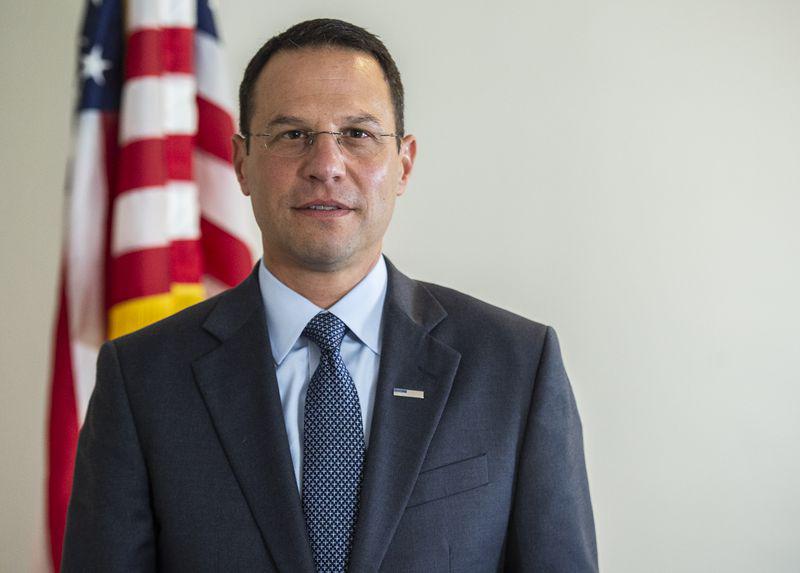|
PA Attorney General calls Allentown Diocese property transfers “deeply concerning”
By Emily Opilo
Pennsylvania Attorney General Josh Shapiro said he is scrutinizing the transfer of properties into trusts by Allentown and other Catholic Dioceses as they were being investigated by a statewide grand jury. In a meeting with Morning Call reporters and editors Friday, Shapiro called the property transfers “deeply concerning" and consistent with a pattern of secrecy the Allentown Diocese, and Bishop Alfred Schlert, displayed in the 2018 grand jury report, which revealed the abuse of more than 1,000 children by 300 priests in six dioceses. “They like to cloak everything in secrecy, they are not transparent, and if they have the opportunity to cover something up, they will,” Shapiro said. “That’s true of Bishop Schlert." The Morning Call reported earlier this month that the Allentown Diocese moved two key properties — the bishop’s home and its main office on Martin Luther King Jr. Drive — into trusts associated with employee pension plans in late 2017 and early 2018. The timing of those moves coincided with a grand jury investigation. Diocese officials have defended the moves, arguing they were made to shore up the two pension plans, which remain underfunded. “The Diocese transferred two properties into pension plans as part of a series of steps it has been taking over the past eight years to continue to shore up these underfunded plans," said spokesman Matt Kerr. "The Attorney General is incorrect in his characterization of these transfers.” Shapiro said parishioners also should be concerned by the transactions. Each property was conveyed to the pension trusts for $1, far below their market values — $580,000 and $1.7 million, respectively. The diocese pays each trust to lease the properties, according to county records. The size of those lease payments has not been disclosed. Elsewhere in the state, the formation of trusts and the use of trust funds by some dioceses to compensate abuse victims have drawn criticism. The Erie Diocese made numerous moves to compartmentalize its assets, including shifting properties into trusts both before and after the grand jury report came out, according to reports in the Erie Times-News. There, the trusts were created in 2005, but property transfers were not completed until more than a decade later, church officials said, calling the timing an “unfortunate coincidence.” In the Pittsburgh Diocese, Shapiro’s office filed a legal action to bar the diocese from paying victims with trust money that was bequeathed to the church to start a school for needy boys. The 120-year-old trust is valued at more than $8 million, according to a report in the Tribune-Review. Shapiro’s office argued that payments to victims are inconsistent with the trust’s intent. “We will scrutinize every transaction like that and make sure the purpose that the money is being used for comports with the underlying requirements of that particular trust,” he said Friday. Pennsylvania’s grand jury report spurred other states to action, including New York and New Jersey, which have approved measures to make it easier for sexual abuse victims to seek damages from the Catholic Church. But similar proposals in Pennsylvania have stopped short of passage. The report recommended four changes:
Dioceses across Pennsylvania have instead established victim’s compensation funds that will make payments approved by independent administrators. Allentown’s fund recently closed a four-month window for victims to apply. About $5.3 million has already been paid to 30 victims and at least 73 others have put in claims. More than 50 priests in the diocese have been accused of abuse, including 37 named in the grand jury report. The diocese controls more than 275 parcels in Lehigh and Northampton counties worth more than $300 million. Records show more than 70 titleholders on the deeds, including bishops, priests and parishes. Diocese officials say most of those holdings belong to parishes and can’t be sold to compensate victims. Shapiro said Friday that he sees a continuing role for his office in lobbying the Legislature for the reforms recommended by the grand jury. To date, the state House has passed multiple bills that address pieces of the four proposals, however, the state Senate has not taken a vote on the measures. Shapiro put the blame on the shoulders of Senate President Pro Tempore Joe Scarnati, R-Jefferson, who has blocked efforts to vote on the issue. “He will either do this because he gets pressure from his members to do it, or he won’t be the leader anymore,” Shapiro said. “At the end of the day, the voice of the victims in Pennsylvania will drown out the voice of the insurance company lobbyists that the Republican leadership in the Senate seem to want to listen to, and will drown out the voices of some of these leaders of the church who continue to stand against this.” Eighty to 90% of lawmakers support the reform measures, Shapiro estimated, noting he remained confident the issue would eventually come to a head. Contact: eopilo@mcall.com
|
.
Any original material on these pages is copyright © BishopAccountability.org 2004. Reproduce freely with attribution.
